TERRITORIES
The "Temporelles" Congress 2017 : It's time to go beyond our borders!
December 2017On 16 November, the MOT took part in the 2017 edition of the "Temporelles" organised by Tempo Territorial and the Lille European Metropolis.

On 16 November, the MOT took part in the 2017 edition of the "Temporelles" organised by Tempo Territorial and the Lille European Metropolis.
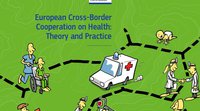
This publication, to which the MOT has contributed, notably by producing the maps, aims to take stock of cross-border cooperation in the field of health and the evolution of Europe’s role in the healthcare sector in global terms, by focussing on 7 experiences in Europe and by looking closely at the French-Belgian situation.
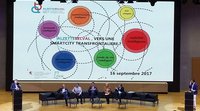
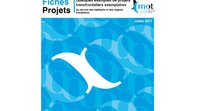
Every year, the MOT publishes a dossier highlighting exemplary cross-border projects along French borders.
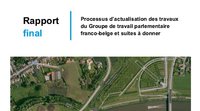
This report was drawn up within the framework of the strengthening and deepening of Franco-Belgian cooperation initiated by the Nord-Pas-de-Calais Prefecture.
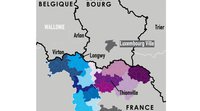
This report, submitted by the General Commission for Territorial Equality (CGET) to the Prime Minister, recommends the creation of a pôle métropolitain encompassing more than 300,000 inhabitants on the border with Belgium and Luxembourg. This would enable North Lorraine to take advantage of its geographical position and of the great attractiveness of its immediate neighbours.
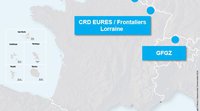
The annual meeting of the network on 15 March in Belval gave the MOT's new members the opportunity to speak, and these new members were presented to all of the participants.
“A shared region and shared risks must not be faced with obstacles to the carrying out of missions by emergency services in emergency situations.”

Kussbus is a Luxembourg start-up which has just launched an innovative home-work shuttle service in the Luxembourg-France-Belgium-Germany border territory.
A report by the Senate released on 14 December 2016 sets out proposals to improve the care given to French disabled people in Belgian institutions.
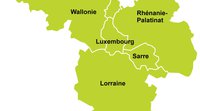
At the request of Luxembourg's Ministry for Sustainable Development and Infrastructures, acting on behalf of the different bodies of the Greater Region's Summit, a consortium led by the North Lorraine urban planning agency (AGAPE) in collaboration with the MOT, the urban planning agencies of Metz (AGURAM) and Nancy (ADUAN), and the Technical University of Kaiserslautern, carried out an assignment to assist with the drawing-up of the Greater Region's territorial development plan.

After several decades of innovative projects undertaken between neighbouring countries, cross-border territories have become shared living spaces, and places for discovering a “European citizenship” experienced in daily life.

The members of the CNCD (National Commission for Decentralized Cooperation) approved on 23 November 2016 a White Paper entitled “Diplomatie et territoires" (Diplomacy and Territories) proposed by the French Ministry of Foreign Affairs and International Development.

Close to 300 people gathered in Strasbourg for a major seminar on the cross-border relations of the new “Grand Est” region of France.
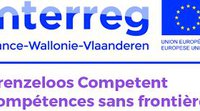
The project “Compétences sans Frontières” (Skills without Borders) was launched on 1 October 2016. Its goal is to contribute to reducing the imbalance of supply and demand in the job market of the France-Wallonia-Flanders cross-border region.

Published by Correspondances Lorraines. Author: Pascale Braun. October 2016. Retail price: €20. Title in English: "The Greater East Region: Europe among Neighbours"
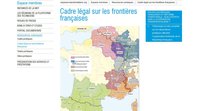
This summer, the MOT completely updated its online legal resources relating to cross-border cooperation law.

The Institut National des Études Territoriales (INET) in Strasbourg has put online a platform designed to centralise a large amount of disparate information about French territorial civil servants' possibilities for mobility in Europe and internationally.

At the instigation of INSEE and its French and Belgian partners, a seminar entitled "Cross-border observation: what type of organisation for what type of actions?" was held in Tournai on 28 April 2016.

The "Grex" platform was set up on 4 January 2016 in order to provide operational support to any sole trader or SME wishing to develop an economic partnership in the Greater Region.
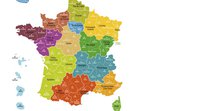
Following the regional elections and the reform which reduced the number of regions in mainland France from 22 to 13, the MOT has published a note (in French) on the new French regions and the territorial reform: what will be the impact on cross-border cooperation?.

On 26 November in Kortrijk, a day based around the theme of innovation and the concept of "Learn do share" was held by the Lille-Kortrijk-Tournai Eurometropolis. Nearly 120 people reflected together on how to develop the Eurometropolis and be involved in it.
Taking note of the “de Ruyter” decision of the CJEU, “the [French] Government specifies in a communiqué published on 20th October the conditions for the introduction of recovery procedures relating to refunds of social contributions made on capital gains by residents and non-residents who are covered by social security schemes of other Member States of the European Union, the European Economic Area, or Switzerland.”
An agreement between the Government of the French Republic and the Government of the Kingdom of Belgium concerning cross-border cooperation in the area of policing and customs has been in force since 1 October 2015 in France.

Since January 2014, the MOT has been carrying out a project supported by the national technical assistance programme Europ'Act relating to the economic development of the cross-border territories along France's borders. The results of this work will be presented at the project's final conference on 30 September in Paris.